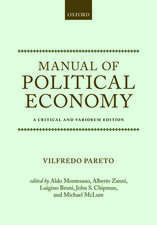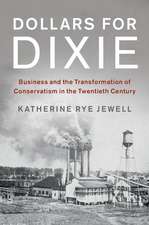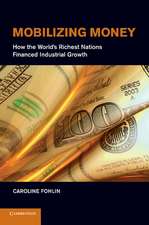Finance Capitalism and Germany's Rise to Industrial Power: Studies in Macroeconomic History
Autor Caroline Fohlinen Limba Engleză Paperback – 20 iul 2011
| Toate formatele și edițiile | Preț | Express |
|---|---|---|
| Paperback (1) | 425.51 lei 6-8 săpt. | |
| Cambridge University Press – 20 iul 2011 | 425.51 lei 6-8 săpt. | |
| Hardback (1) | 783.67 lei 6-8 săpt. | |
| Cambridge University Press – 28 ian 2007 | 783.67 lei 6-8 săpt. |
Din seria Studies in Macroeconomic History
-
![Teach Your Kids about Countries [Vol 5]: Version Adaptada Al Castellano Actual Por Rafael Antunez y Raul Alonso](https://i4.books-express.ro/bs/9781480268197/teach-your-kids-about-countries-vol-5.jpg) Preț: 61.51 lei
Preț: 61.51 lei -
 Preț: 167.96 lei
Preț: 167.96 lei -
 Preț: 95.31 lei
Preț: 95.31 lei -
 Preț: 74.52 lei
Preț: 74.52 lei -
 Preț: 53.96 lei
Preț: 53.96 lei -
![Teach Your Kids about Countries [Vol13]: Version Adaptada Al Castellano Actual Por Rafael Antunez y Raul Alonso](https://i2.books-express.ro/bs/9781480268272/teach-your-kids-about-countries-vol13.jpg) Preț: 61.51 lei
Preț: 61.51 lei -
 Preț: 125.81 lei
Preț: 125.81 lei -
 Preț: 64.79 lei
Preț: 64.79 lei -
 Preț: 131.58 lei
Preț: 131.58 lei -
 Preț: 86.92 lei
Preț: 86.92 lei -
 Preț: 56.92 lei
Preț: 56.92 lei - 9%
 Preț: 592.73 lei
Preț: 592.73 lei -
 Preț: 63.20 lei
Preț: 63.20 lei -
![Teach Your Kids about Countries [Vol 17]: Version Adaptada Al Castellano Actual Por Rafael Antunez y Raul Alonso](https://i2.books-express.ro/bs/9781480268326/teach-your-kids-about-countries-vol-17.jpg) Preț: 61.51 lei
Preț: 61.51 lei -
 Preț: 40.48 lei
Preț: 40.48 lei -
 Preț: 59.67 lei
Preț: 59.67 lei -
 Preț: 54.03 lei
Preț: 54.03 lei -
 Preț: 92.61 lei
Preț: 92.61 lei -
![Teach Your Kids about Countries [Vol4 ]: Version Adaptada Al Castellano Actual Por Rafael Antunez y Raul Alonso](https://i3.books-express.ro/bs/9781480268180/teach-your-kids-about-countries-vol4.jpg) Preț: 61.51 lei
Preț: 61.51 lei -
 Preț: 135.03 lei
Preț: 135.03 lei -
 Preț: 75.99 lei
Preț: 75.99 lei -
 Preț: 104.33 lei
Preț: 104.33 lei -
 Preț: 130.65 lei
Preț: 130.65 lei -
 Preț: 201.11 lei
Preț: 201.11 lei -
 Preț: 83.38 lei
Preț: 83.38 lei -
 Preț: 62.62 lei
Preț: 62.62 lei -
 Preț: 177.10 lei
Preț: 177.10 lei -
 Preț: 123.49 lei
Preț: 123.49 lei -
 Preț: 95.96 lei
Preț: 95.96 lei -
 Preț: 208.23 lei
Preț: 208.23 lei -
![Teach Your Kids about Countries [Vol 22]: Version Adaptada Al Castellano Actual Por Rafael Antunez y Raul Alonso](https://i2.books-express.ro/bs/9781480268371/teach-your-kids-about-countries-vol-22.jpg) Preț: 61.51 lei
Preț: 61.51 lei -
![Teach Your Kids about Countries [Vol 25]: Version Adaptada Al Castellano Actual Por Rafael Antunez y Raul Alonso](https://i0.books-express.ro/bs/9781480268401/teach-your-kids-about-countries-vol-25.jpg) Preț: 61.51 lei
Preț: 61.51 lei -
![Teach Your Kids about Countries [Vol8]: Version Adaptada Al Castellano Actual Por Rafael Antunez y Raul Alonso](https://i2.books-express.ro/bs/9781480268227/teach-your-kids-about-countries-vol8.jpg) Preț: 61.70 lei
Preț: 61.70 lei -
 Preț: 51.11 lei
Preț: 51.11 lei -
 Preț: 96.04 lei
Preț: 96.04 lei -
 Preț: 96.45 lei
Preț: 96.45 lei -
 Preț: 46.84 lei
Preț: 46.84 lei -
![Teach Your Kids about Countries [Vol2]: Version Adaptada Al Castellano Actual Por Rafael Antunez y Raul Alonso](https://i1.books-express.ro/bs/9781480268166/teach-your-kids-about-countries-vol2.jpg) Preț: 61.51 lei
Preț: 61.51 lei -
 Preț: 55.99 lei
Preț: 55.99 lei -
 Preț: 69.21 lei
Preț: 69.21 lei -
 Preț: 72.83 lei
Preț: 72.83 lei -
 Preț: 93.90 lei
Preț: 93.90 lei -
 Preț: 88.56 lei
Preț: 88.56 lei -
 Preț: 51.36 lei
Preț: 51.36 lei -
 Preț: 80.19 lei
Preț: 80.19 lei -
 Preț: 78.74 lei
Preț: 78.74 lei - 20%
 Preț: 45.72 lei
Preț: 45.72 lei -
 Preț: 212.46 lei
Preț: 212.46 lei -
 Preț: 71.19 lei
Preț: 71.19 lei
Preț: 425.51 lei
Nou
Puncte Express: 638
Preț estimativ în valută:
81.42€ • 87.07$ • 67.89£
81.42€ • 87.07$ • 67.89£
Carte tipărită la comandă
Livrare economică 18 aprilie-02 mai
Preluare comenzi: 021 569.72.76
Specificații
ISBN-13: 9780521396608
ISBN-10: 0521396603
Pagini: 406
Dimensiuni: 152 x 229 x 23 mm
Greutate: 0.59 kg
Editura: Cambridge University Press
Colecția Cambridge University Press
Seria Studies in Macroeconomic History
Locul publicării:New York, United States
ISBN-10: 0521396603
Pagini: 406
Dimensiuni: 152 x 229 x 23 mm
Greutate: 0.59 kg
Editura: Cambridge University Press
Colecția Cambridge University Press
Seria Studies in Macroeconomic History
Locul publicării:New York, United States
Cuprins
1. Introduction; 2. The development of the German corporate finance system until 1913; 3. Theoretical perspectives on banking and financial system structure; 4. The development and impact of universal banking; 5. Corporate governance relationships: patterns and explanations; 6. Firm financing and performance; 7. Securities markets; 8. Upheaval and recovery; 9. Conclusion.
Recenzii
Blending archival research with sophisticated econometrics, Fohlin provides a finely tuned view of universal banking. The book sheds new light on the links between financial structures and economic development while at the same time making a refined contribution to the debate on the varieties of capitalism. It is recommended reading not only for economic historians but for economists and political scientists as well. -- Gianni Toniolo, Università di Roma Tor Vergata and Duke University
The role of so-called universal banks as a driving force in German industrialization, 1850-1914, has long been a staple of economic history. Fohlin challenges this conventional wisdom by showing that Germany's vibrant stock markets complemented universal banks in providing finance to numerous firms. Bank dominance of company finance and the atrophy of German stock markets, she demonstrates, arose in the twentieth century rather than being, as we once were taught, a distinct 'German path' to industrialization before 1914. -- Richard Sylla, New York University
This book is an important contribution to the debate on the advantages and disadvantages of different types of financial systems. By looking at the German economy at the end of the nineteenth and beginning of the twentieth century, Professor Fohlin focuses on a period where it is widely believed that the German economy was successful. She is able to consider in a more detached way how much of this success is due to the structure of the financial system. The book's strength is based on Professor Fohlin's ability to use her knowledge of financial economics and history to analyze the issues. Her conclusion that most of the mechanisms of universal and relationship banking were adopted only late in the industrialization process and that they had little discernible effect on firms' performance is an important contribution. -- Franklin Allen, Wharton School, University of Pennsylvania
An impressive piece of work! Relying on extensive data collection and encompassing empirical analysis, Caroline Fohlin provides us with a new understanding of the role of banks in late-nineteenth-century Germany. The myth of relationship banking as the mainspring of Germany's rise to industrial power is thoroughly debunked bank influence emerged after industrialization was well under way, and was much less pervasive than the myth would have it. Contrary to another one of these myths, Fohlin also shows that banks and markets need not be opposites. In pre-1913 Germany, the stock market was a source of power to banks and flourished nonetheless. The reality of financial systems is richer than the myths. -- Martin Hellwig, Max Planck Institute
The role of so-called universal banks as a driving force in German industrialization, 1850-1914, has long been a staple of economic history. Fohlin challenges this conventional wisdom by showing that Germany's vibrant stock markets complemented universal banks in providing finance to numerous firms. Bank dominance of company finance and the atrophy of German stock markets, she demonstrates, arose in the twentieth century rather than being, as we once were taught, a distinct 'German path' to industrialization before 1914. -- Richard Sylla, New York University
This book is an important contribution to the debate on the advantages and disadvantages of different types of financial systems. By looking at the German economy at the end of the nineteenth and beginning of the twentieth century, Professor Fohlin focuses on a period where it is widely believed that the German economy was successful. She is able to consider in a more detached way how much of this success is due to the structure of the financial system. The book's strength is based on Professor Fohlin's ability to use her knowledge of financial economics and history to analyze the issues. Her conclusion that most of the mechanisms of universal and relationship banking were adopted only late in the industrialization process and that they had little discernible effect on firms' performance is an important contribution. -- Franklin Allen, Wharton School, University of Pennsylvania
An impressive piece of work! Relying on extensive data collection and encompassing empirical analysis, Caroline Fohlin provides us with a new understanding of the role of banks in late-nineteenth-century Germany. The myth of relationship banking as the mainspring of Germany's rise to industrial power is thoroughly debunked bank influence emerged after industrialization was well under way, and was much less pervasive than the myth would have it. Contrary to another one of these myths, Fohlin also shows that banks and markets need not be opposites. In pre-1913 Germany, the stock market was a source of power to banks and flourished nonetheless. The reality of financial systems is richer than the myths. -- Martin Hellwig, Max Planck Institute
Descriere
This book offers insights into the development of the German corporate finance system.


















